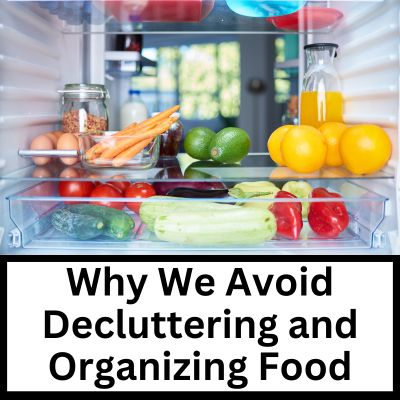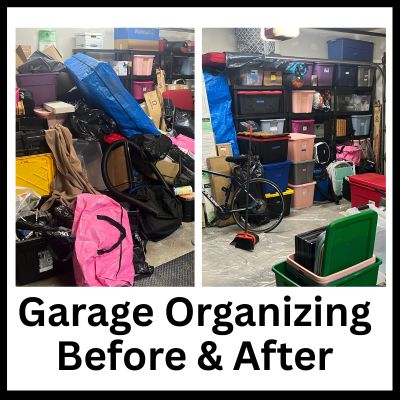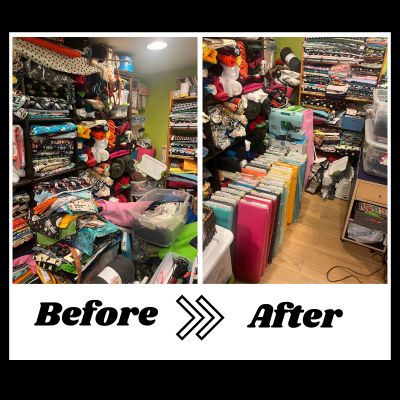Why We Avoid Decluttering and Organizing Food

Are you someone who avoids decluttering and organizing the food in your home? Do you put off cleaning out the fridge? Do you dread sorting through your pantry? In this post, I’ll talk about the top reasons people avoid organizing their food, and how to reframe your thinking so that you can do it with confidence.
Problem:
You have a lot of guilt for wasting food. You know you want to organize your food, but deep down, you know a lot of it just needs to be tossed. You feel the obligation to compost and recycle (boxes, cans, jars) what you can, versus just throwing it out. You know you “should” donate what you don’t want to a food bank.
Solution:
While meal-prep might be a solution, it may not be the correct solution for you at this time. Don’t add another thing to your “should do” list unless the idea of doing it really lights you up. The more you go through your food on a regular basis, you will find it easier and easier to use your food up before it goes bad. When your food storage is free from clutter, you will feel inspired to cook more and eat it rather than forgetting about it. Guilt provides the purpose of helping you adhere to your moral compass. Once you’ve learned the lesson, you need to let go of the guilt because it will prevent you from moving forward. If you have the capacity to compost or recycle when you can, that’s great, but if you don’t, that’s ok too. It’s better to let go of it and hopefully not let it get to this point again. If you have the capacity to donate to a local food bank (or post online to a free neighborhood group), please go ahead and do it, but DO NOT give away expired food! This adds a tremendous amount of work for food banks.
Problem:
You know there’s something you don’t like, but instead of getting rid of it while it’s still good, you wait until it really goes bad. I know I’ve done it. This is a common problem. We just can’t bare throwing out a perfectly good [whatever] because we don’t like it. We somehow ration to ourselves that it will get better with time (?) or that someone else at home will eat it (they won’t). This problem might also be seen in your relationships or career. You know someone or something isn’t a good fit, but you stick it out until it gets really bad, so you have a concrete excuse to distance yourself or behave in a certain way.
Solution:
Trust your gut. I know this is easier said than done. The more practice you get with the little stuff (like food you don’t like), the better you will get with the more important stuff (like gracefully exiting a relationship or handing off a project at work).
Problem:
“Maybe you’ll want it later” (you’re indecisive).
Solution:
Ask yourself these questions: Do I have space to keep this? What is my track record for eating this type of food? How much longer will it stay fresh for? Will my upcoming social, travel, and work schedule allow for me to realistically consume this before it goes bad? Decision making is a component of executive functioning. One of the ways to improve executive functioning skills is to learn to calm your mind.
Problem:
You’re too grossed out to go through your old food. Whether it be the smell, an insect infestation, or just the sight of old food, you can’t bear to deal with it on your own.
Solution:
I grew up around horses, so I have a fairly high tolerance for what I consider “gross”. If your kitchen really grosses you out, you have two choices. One is to “buck up” and just do it. Use this as an opportunity to overcome some fears, get out of your comfort zone, and deal with your mistakes head on. However, if this is TOO much of a stretch for you, don’t push yourself beyond your limits. Only you can decide. If dealing with your old food is beyond your capacity right now, hire someone else to do it for you.
Problem:
Your emotions prevent you from dealing with your food that’s past it’s prime. Maybe you get stuck in a clutter-depression-anxiety cycle. Perhaps you get overwhelmed, overstimulated, or frustrated. It’s possible that you feel a lot of shame or embarrassment for letting it get so bad. Or maybe you have an emotional attachment to your old food.
Solution:
It’s really important to acknowledge your emotions and address them as they come up. Identify where you feel them in your body. Figure out what’s really the problem. State the problem very clearly. Ask yourself if there is something within your control. If no, is there anything you can do about it? Or if yes, what are you going to do? Go ahead and do it, and redirect your mind back to joy. Another really important thing to remember here is to notice when that little negative voice in your head arises. This is your ego. It wants you to stay the same. When you notice it, instead of letting it run it’s mouth and take over, acknowledge it, but ask yourself, “what if I’m actually better at organizing than I think?”. Interrupting the negative thought pattern with a positive question will help you carve new neural networks in your brain.
Problem:
You lack the time to get the job done.
Solution:
There are all kinds of reasons why it’s hard to find the time to get the job done. Decide whether you’re overcommitting in other parts of your life and need to dial it back in the name of self-care. Or if you’re really happy with your life and you don’t want to stop doing any of your activities, you’ll need to delegate this task to someone else. Just make sure you’re not burning the candle at both ends.
Problem:
You lack the skills to get the job done. Maybe you don’t know where to start. Or once you do get started, you just end up moving things around, but nothing really changes.
Solution:
Hire a Professional Organizer! Our job is to transfer organizing skills to our clients. Or if you want more of a DIY solution, continue reading my blog. Read organizing books, watch YouTube videos, or ask people you know who are good at organizing.
Problem:
Someone else messes it up shortly after you’ve organized everything.
Solution:
Have you created a system that is easy to follow? Does your system account for the variety of food that gets stored in your home? Do you need to add labels or make any adjustments? Have you kindly and patiently communicated the system to everyone in the home? Are there larger boundary issues that need to be addressed with the offending party? Living with other people can be tough, especially when people have differing organizational habits. Decide whether this is a battle that is worth fighting.
Here are two other articles that I’ve written about food organization:
https://seattlesparkle.com/refrigerator-avoidance/
https://seattlesparkle.com/food-organization/

Posted By Jean Prominski, Certified Professional Organizer
- Follow me on Instagram @seattlesparkle
- Join my Facebook Group, Declutter and Organize with Seattle Sparkle.
- Ready to book a consultation? Complete this form.




